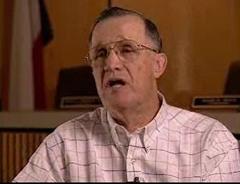 Charles Sebesta, Former Texas DA, Sent Innocent Man To Death Row, But Never Faced Discipline
Charles Sebesta, Former Texas DA, Sent Innocent Man To Death Row, But Never Faced DisciplineLegal
Local
Charles Sebesta still has his license to practice law in Texas, even though the former Burleson County District Attorney once railroaded an innocent man onto death row.
And according to an investigative piece this week in Texas Monthly, Sebesta misrepresents facts about the case on his own web site, but has not been disciplined for that either, despite Texas rules forbidding lawyers from fudging their credentials.
Anthony Graves was convicted in 1994 for his alleged part in a particularly gruesome and horrific mass murder of six mebers of the same family in Somerville, Tex., two years earlier. Bobbie Davis, 45, and four of her grandchildren — ages 4 through nine — were stabbed, strangled and bludgeoned. Her 16-year-old daughter, Nicole, was shot multiple times. Then whoever killed them, set the whole house ablaze.
Firefighters found the bodies when they came to put out the fire.
Robert Earl Carter, a cousin of Graves, who was being threatened with a paternity suit by another of Bobbie Davis’s daughters, told prosecutors that he killed the family along with Graves and a third person whom he identified only as “Red.”
Carter testified that Graves took part in the murders but soon changed his story. He insisted that he alone killed the Davis family members, declaring Graves’ innocence even in his last words before he was executed by lethal injection on May 31, 2000.
“It was me and me alone,” Carter said, in his final statement. “Anthony Graves had nothing to do with it. I lied on him in court.”
Sebesta (pictured) says that Carter was trying to protect his wife who was, the prosecutor believed, the second accomplice called only “Red.” The executed killer insisted on Graves’ innocence only because he was “fearful that Graves might turn on Theresa in exchange for a ‘deal.’”
Of course, Graves could have done that during his own trial, but didn’t.
In 2006, the U.S. Fifth Circuit Court of Appeals threw out Graves’ conviction and ordered that he get a new trial. The court found that Sebesta held back evidence that could have exonerated Graves, namely, Carter’s statements that he committed the murders alone.
The court also said that Sebesta threatened a family member of Graves who gave him an alibi. Sebesta allegedly warned the witness that she could be prosecuted for the murders as well, if she testified.
As for Carter, “Sebesta told Carter that if he didn’t testify against Anthony, he would prosecute Carter’s wife instead,” Graves’s attorney, Nicole Cásarez, explained. That’s why Carter testified against Graves in court, but then recanted.
Carter’s wife, the supposed “Red,” was charged in the murders but never came to trial.
Graves was never retried. Prosecutors conducted a new investigation and found that there was nothing to implicate him in the murders outside of Carter’s recanted testimony. He was freed from prison in 2010 and the following year, won $1.45 million from the state as compensation for his 18-years of wrongful imprisonment.
On his web site, Sebesta says that the Texas State Bar “cleared” him of “any wrongdoing in the case.” But Texas Monthly reporter Pamela Colloff checked out his claims and found that they are misleading at best.
This dismissal was based on the fact that the complaint was brought forth well beyond the four-year statute of limitations our office is bound by,” Linda Acevedo, the Bar’s chief disciplinarian told Colloff.
That is, the Bar Association never cleared Sebesta. It simply threw out the grievances against him on a technicality, without even checking them out. But Sebesta is allowed to distort that fact on is web sitem because Texas rules apply only to advertising and statements made to potential clients, Acevdo exlplained.
Even if the Bar had found that Sebesta did engage in misconduct in the Graves affair, not much would likely have happened. In 91 cases since 2004 in which courts have found that prosecutors committed misconduct, not one was ever disciplined.
SOURCES: Texas Monthly, Mother Jones, National Registry of Exonerations, Texas Department of Criminal Justice, Murderpedia
1 Reported by Opposing Views 10 hours ago.